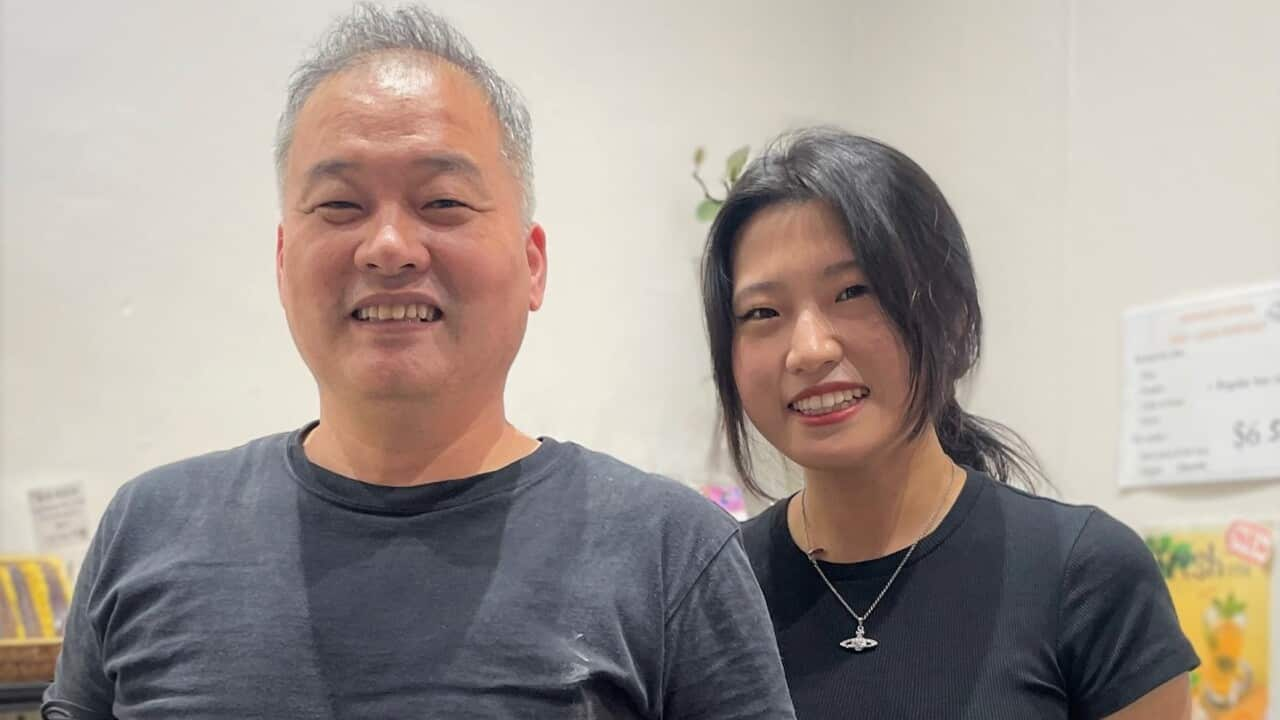Produced in collaboration with SBS Chinese and SBS Korean
TRANSCRIPT
In the early hours of the morning, rice cakes are rolling off the production line at the Siroo Rice Cake Cafe in Sydney’s north-west. It’s a Korean family business, that draws on ancient skills to produce traditional rice cakes known as tteok. For café customer Ahro Go, tasting traditional rice cakes revives childhood memories.
“I feel like having the rice cake feels like coming home. So yeah, it's very enjoyable to eat.”
Owner Changhyun Lee is 52-years-old and has honed his skills making rice cakes for over three decades. It’s a skill he learned growing up, and working in his family’s rice cake store in Korea.
But its only during the Mid-autumn or Moon Festival – known as Chuseok in Korea - that Mr Lee turns his hand to making a specialty treat, called songpyeon.
“ Chuseok is a busy day, but Chuseok is a day when families can get together. In Korea, it's a day when you can see all your family. It's a day when almost all families get together once a year, including mom, dad, brothers, and nephews.”
Traditionally, songpyeon are given as gifts, along with wishes for a long life, free of misfortune. The colourful cakes come in different shapes and sizes… including diamonds, flowers and crescents. It’s a tradition believed to date back two-and-a-half thousand years, with recipes handed down through generations.
Changyhun’s daughter and manager of Siroo Rice Cake Café, Jenny Lee explains:
“Normally there's different toppings in it, like sesame seeds, like Mung beans, black beans, and it's all steamed. And that's normally we eat it together as a family.”
The mid-Autumn or Moon Festival is one of Asia’s biggest holidays, when extended families celebrate together. For the Lee family September is also one of the busiest months, as Jenny Lee explains:
“During the period we will be constantly just pumping out. So hundreds and hundreds. Because we make all the rice cakes fresh in the morning, when customers come in to buy it in the morning especially, it's still very warm. So they're just kind of eating rice cakes that are just freshly made and that are freshly packaged. And because we only just sell the batch that we make on the day within the day, so they're always guaranteed to eat the fresh ones.”
Ms Lee says rice cakes are growing in popularity with both the Korean and broader non-Korean communities.
“I think dad opened the shop because he wanted Koreans to have a bit more accessibility to our traditional food. And not only that, he wanted to spread a bit of awareness to people who are non-Korean as well, because we have a lot of non-Korean people coming in and they always ask us questions, and we're always happy to help and happy to answer as well.”
While Koreans celebrate with rice cakes, in Japan, tsukimi or ‘moon viewing’ rice dumplings are also popular. In China, mooncakes are filled with ingredients like red beans, pork, salted egg or crushed nuts. The round shape symbolises a full autumn harvest moon.
Joy Jaune is an online mooncake vendor, one of many supplying local and international customers. Founder Joey Leung explains the mooncakes’ cultural significance.
“3000 years ago for the Chinese culture, we celebrate the moon festival for wishing everyone's happiness and then wishing everyone healthy. So, this is very important day for the whole year.”
Ms Leung describes the round treats with their sweet or savoury filling as ambassadors of Chinese culture.
“The moon cakes are cultural items. So it is for the people that celebrate the festival and then it is for the people that to have the best wishes. So for the Australian that maybe they don't know about this culture. And when I make one cake, I always have this mind and I feel this is my mission to tell people that we have this culture and I would like to introduce some new thing.”
Ms Leung gave up a career in advertising when she migrated from Hong Kong to Melbourne in 2013. The 42-year-old later trained as a pastry chef.
“I love Melbourne. I love the food culture. That's why I decide I want to be a part of it. I definitely prefer pastry pastry chef because it's a really, really interesting job. I really love it. So I feel it is very physical work, but I really love it. I can't think of anything else I want to do.”
Ms Leung’s online business made and sold eclairs and madelaines until other Hong Kong migrants began asking for mooncakes. This year she says her one-woman business has already despatched 1,000 boxes.
“The last three weeks, I work almost six day per week and then every day, its just like the moon cake is in my brain actually. And yeah, so I couldn't attend to my friend's dinner. I just make moon cakes.”
Traditionally, moon cakes are filled with salted egg yolk and custard. But Ms Leung has innovated, with newer tea-inspired flavours like matcha and hojicha.
“It is very special. it looks like cookies, but it's more than that. it is truly a labor of love. So we spend a lot of effort and time to make it the texture and the really good taste”
For Changhyun Lee and his family… running a successful business is also about preserving traditions, like songpyeon, for future generations.
“I see a case where a non-Korean family would continue their family business for several hundred years, and I think it would be great if we could do the same and continue that legacy.”













